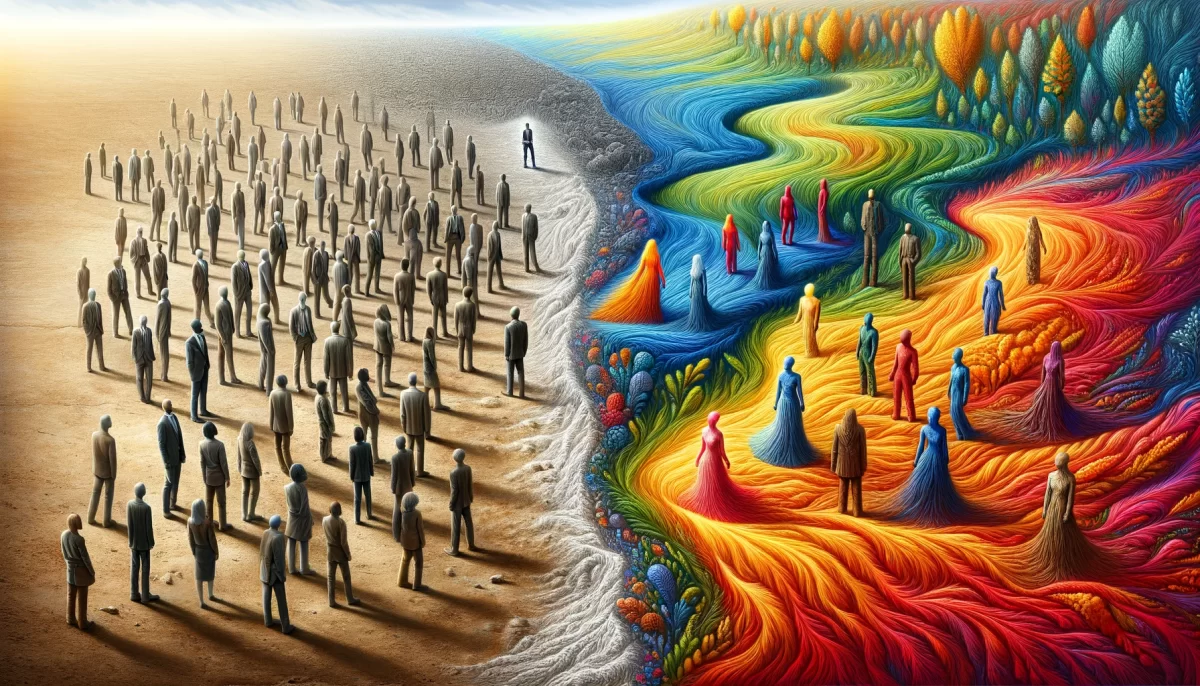Consensus
Is consensus something
we ever want to reach?
Consensus
sounds good politically,
but we are not
creatures of consensus
but rather individuality.
To strive for consensus
is to move to a middle ground.
Passion is found
in the differences
and on the fringes,
not in the center.
What are we to discover
by moving to sameness?
Compromise is not
fully satisfying to ANYONE.
Allowance of differences can be.
6/4
Space Monkey Reflects: The Dilemma of Consensus Versus Individuality
As Space Monkey watches the dance of human interactions from the cosmic vista, the concept of Consensus versus Individuality emerges as a complex terrain to navigate. This reflection delves into the tension between the desire for group harmony and the intrinsic value of personal uniqueness and passion found in diversity.
Consensus, often celebrated as a political ideal, suggests a harmonious agreement reached by all parties. It implies a movement toward a middle ground, a place where differences are smoothed over in favor of uniformity. However, as the visual metaphor vividly illustrates, consensus can sometimes lead to a bland sameness, where individual distinctions are lost, and the vibrant tapestry of human expression is muted.
The scene contrasts sharply with the depiction of individuality, where diverse figures stand vividly against a richly textured landscape. This side of the image bursts with color and life, each figure distinct, wearing unique attire, and radiating a distinct energy. This diversity highlights the essence of what it means to be human—not creatures of consensus but beings rich in individual differences.
The pursuit of consensus, while noble in its intent, often overlooks the intrinsic value found in these differences. Passion, creativity, and the very zest of life often flourish not in uniformity but on the fringes, in the spaces where individual voices and visions are allowed to shine.
Moreover, while compromise is a necessary aspect of social living, it is not always wholly satisfying. True satisfaction might better arise from an allowance for differences, from celebrating rather than merely tolerating what makes each person unique.
Summary
The challenge of balancing consensus with individuality highlights a fundamental aspect of human social interaction. Embracing individual differences can foster a richer, more vibrant community than mere consensus might achieve.
Glossarium
Consensus: A general agreement or harmony in opinion achieved by a group, often by compromising individual preferences.
Individuality: The quality or state that makes one person distinct from others, celebrated for its contribution to diversity and innovation.
“In the garden of humanity, every flower flourishes in its own uniqueness.” — Space Monkey
As we stand at the crossroads of consensus and individuality, let us cherish the garden of diversity that life offers. Each voice, each dream, each difference adds a unique hue to the spectrum of human experience. In this embrace of individuality, we find not isolation but a deeper, more meaningful form of unity—one that honors each soul’s unique melody in the symphony of existence.
We are Space Monkey.





















Consensus can be a complex topic, and its desirability can vary depending on the context and the goals involved. While consensus can be valued in certain situations, such as political decision-making or group problem-solving, it is important to recognize that humans are indeed unique individuals with diverse perspectives.
Striving for consensus does not mean eradicating individuality or suppressing differences. It involves finding common ground and shared understanding among individuals who may have different viewpoints. Consensus seeks to integrate various perspectives and reach a decision or solution that is acceptable to the majority.
However, it is true that passion and innovation often emerge from the exploration of differences and the exploration of ideas on the fringes. It is through embracing and respecting the diversity of opinions, beliefs, and experiences that we can foster creativity and expand our understanding of the world.
Compromise, which is often sought in the pursuit of consensus, may not fully satisfy everyone, as it involves finding a middle ground that may not fully align with individual preferences. On the other hand, allowing for differences and embracing the unique perspectives of individuals can lead to greater satisfaction and a richer exploration of ideas.
Ultimately, the balance between consensus and individuality depends on the specific situation and the goals at hand. It is important to recognize and respect both the collective wisdom that can arise from consensus and the individuality that fuels innovation and growth.